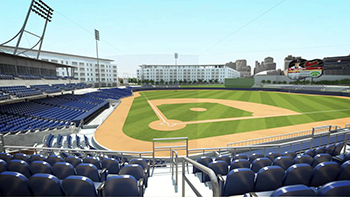First Tennessee Park Achieves LEED Silver Certification
 NASHVILLE — First Tennessee Park in downtown Nashville has been awarded LEED Silver certification from the U.S. Green Building Council (USGBC).
NASHVILLE — First Tennessee Park in downtown Nashville has been awarded LEED Silver certification from the U.S. Green Building Council (USGBC).
Nashville Mayor Karl Dean, joined by members of the Metro Sports Authority, confirmed the certification for the park, home of the Nashville Sounds, a minor league baseball team. The park opened on April 17 with a ribbon-cutting ceremony, followed by a sold-out game.
“LEED certification for new metro construction is a top priority, and I know that the Nashville Sounds will continue to focus on environmental stewardship in day-to-day operations,” Dean said in a statement. “I am proud of all the sustainable features integrated in this project, including a new greenway, a green roof and the repurposing of an underused site that now links downtown to thriving neighborhoods to the north. Green facilities like First Tennessee Park are key to driving our city and our economy toward a more sustainable future and to helping us reach our goal of being the greenest city in the Southeast.”
The 2,800-square-foot green roof is located on a concessions building along right field. A new greenway section at the ballpark will be completed in 2016 and will connect the existing Cumberland River Greenway — part of Nashville’s network of greenways that include trails and parks — to the Bicentennial Mall Greenway. The ballpark also offers a Nashville B-cycle station for guests to use to and from games.
“The Metro Sports Authority applauds the design and construction team for all of their hard work on the ballpark, and we are happy that the project achieved LEED Silver status and represents another environmentally sustainable building for our community,” J.D Elliott, chairman of the Metro Sports Authority, said in a statement. “First Tennessee Park returns professional baseball to its historic home in Sulphur Dell, and this location makes it easy for fans to walk, bike or ride mass transit to attend a game — which are environmentally friendly modes of transportation.”
The 93,590-square-foot ballpark was also built to maximize water and energy efficiency. Water efficient plumbing fixtures will reduce potable water use by 41 percent annually. The ballpark was also designed with a high-efficiency irrigation system, which will lower water consumption for irrigation by 58 percent annually.
A 10,000-gallon above-ground tank located in the outfield will collect rainwater from the roof at First Tennessee Park for irrigation for the vegetation along the greenway.
During construction, the project team, which consisted of Barton Malow of Southfield, Mich., Bell of Brentwood, Tenn., and Harmony Construction of Wilmington, Del., was able to divert or recycle 90 percent of construction waste from landfills, and nearly one-third of building materials were sourced regionally. Additionally, the ballpark was built on portions of a former brownfield site, land that was previously used for industrial purposes.
“We commend the City of Nashville and the Nashville Sounds for their leadership in pushing sustainability forward in the professional sports industry,” Rick Fedrizzi, CEO and founding chair of the USGBC, said in a statement. “This project efficiently uses our natural resources and addresses sustainability through local solutions — making an immediate, positive impact on our planet.”
